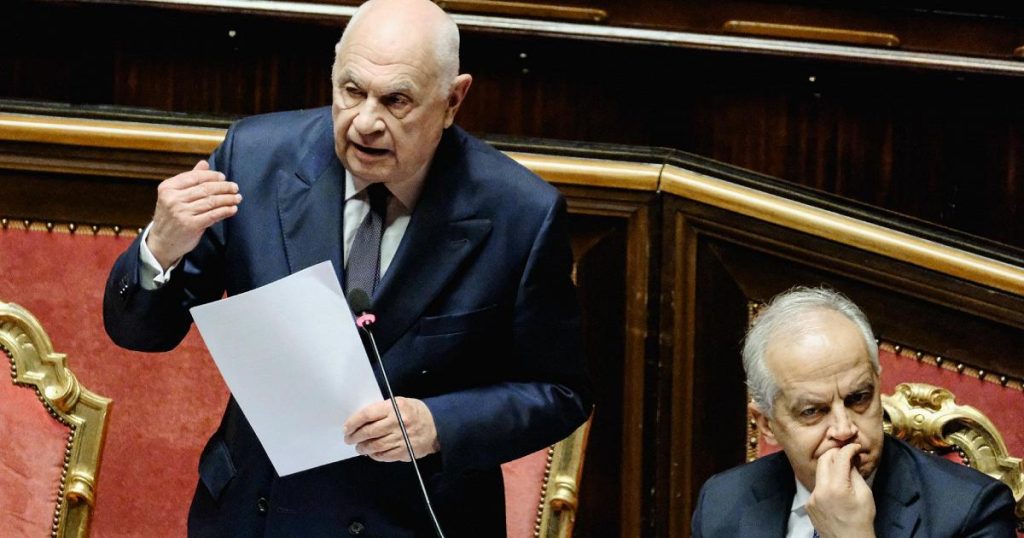A Political Storm in Italy: The Debate Over Almasri and the Role of Leadership
The Italian political landscape has been set ablaze by a fiery debate in the Senate, with the Minister of the Interior at the center of a heated exchange. The controversy revolves around the case of a dangerous criminal, allegedly linked to human trafficking, who was released despite the efforts of the police. This incident has sparked a wave of criticism, with opposition leaders seizing the opportunity to question the government’s handling of such sensitive matters. At the heart of the debate is the figure of Matteo Renzi, a prominent senator and former Prime Minister, who did not hold back in his critique of the current administration, particularly targeting Giorgia Meloni, the Prime Minister of Italy.
Renzi’s Scathing Critique: Meloni’s Leadership Under Fire
Matteo Renzi, known for his sharp wit and oratory skills, delivered a scathing attack on Prime Minister Giorgia Meloni during the Senate debate. He referred to a statement Meloni had made earlier, in which she expressed a commitment to combating human traffickers. Renzi accused her of failing to act decisively when the opportunity arose, allowing a high-profile criminal to slip through the system. In a provocative tone, Renzi declared, "Meloni had the bosses’ boss, the number one boss, in her hands, and she let him run away. From this moment on, Meloni will no longer be able to talk about migrants and traffickers." Renzi’s words were a direct challenge to Meloni’s credibility on the issue, questioning her ability to lead effectively on matters of national security and justice.
The Use of Metaphors: Pinocchio and the Man of Butter
In characteristic style, Renzi employed a series of metaphors to drive his point home, drawing inspiration from the beloved fairy tale "The Adventures of Pinocchio." He likened Meloni to the "man of butter," a character in the story who is weak and easily manipulated. Renzi’s analogy suggested that Meloni, despite her tough public persona, is incapable of standing firm against the powerful and instead yields to pressure. He further mocked her by comparing her to Margaret Thatcher, the "Iron Lady" of British politics, implying that Meloni’s leadership is far from the strong, decisive figure she aspires to be. Instead, Renzi painted her as a leader who is "strong with the weak and weak with the strong."
The Fairy Tale Continues: Pinocchio and the Lord of the Rings
Renzi’s metaphors did not stop there. He also drew a parallel between the current political climate and J.R.R. Tolkien’s "The Lord of the Rings," a narrative that has been invoked by Meloni’s party to frame their political vision. Renzi accused Meloni of trying to position herself as a heroic figure in this grand narrative but failing miserably. Instead of the strong leader she purports to be, Renzi suggested that Meloni is more akin to a character who leads children astray, promising them a utopia but delivering something far less noble. He also referenced other figures in the fairy tale, casting doubt on the loyalty and integrity of Meloni’s allies, such as Nordio and Delmastro, whom he likened to the fox and the cat from "Pinocchio."
A Personal Jab at Delmastro
In addition to his broader critique of Meloni, Renzi also took aim at another political figure, Delmastro, with a particularly biting remark. He suggested that Delmastro’s track record, including his support for individuals like Almasri, was lacking in substance and courage. Renzi quipped, "If Delmastro of the widows sees Almasri’s curriculum and proposes it for the DAP, this is little but safe." The comment was a clear attempt to undermine Delmastro’s credibility, implying that his actions were driven more by political expediency than a genuine commitment to justice or leadership.
The Broader Implications: A Call for Stronger Leadership
The debate in the Senate has far-reaching implications for Italian politics. At its core, the discussion centers on the ability of the current government to address critical issues such as crime, migration, and national security. Renzi’s critique of Meloni’s leadership style and her handling of the Almasri case reflects a deeper frustration with the perceived weakness of the government in dealing with these challenges. The use of metaphors from fairy tales and epic narratives serves to highlight the gap between the government’s rhetoric and its actual performance. By invoking these stories, Renzi aims to expose what he sees as the hollowness of Meloni’s leadership and to rally support for a more robust and decisive approach to governance.
Conclusion: The Battle for Italy’s Future
The debate over the Almasri case and the ensuing metaphorical sparring match between Renzi and Meloni underscore the intense political battles being waged in Italy. At stake is not just the credibility of individual leaders but the direction of the country as a whole. Renzi’s scathing critique of Meloni’s leadership serves as a call to action, urging the government to demonstrate greater strength and resolve in addressing the nation’s challenges. As the political drama unfolds, it remains to be seen whether Meloni will be able to weather the storm and emerge as the strong leader she aspires to be, or if her opponents will succeed in painting her as the "man of butter," weak and incapable of leading Italy forward.












